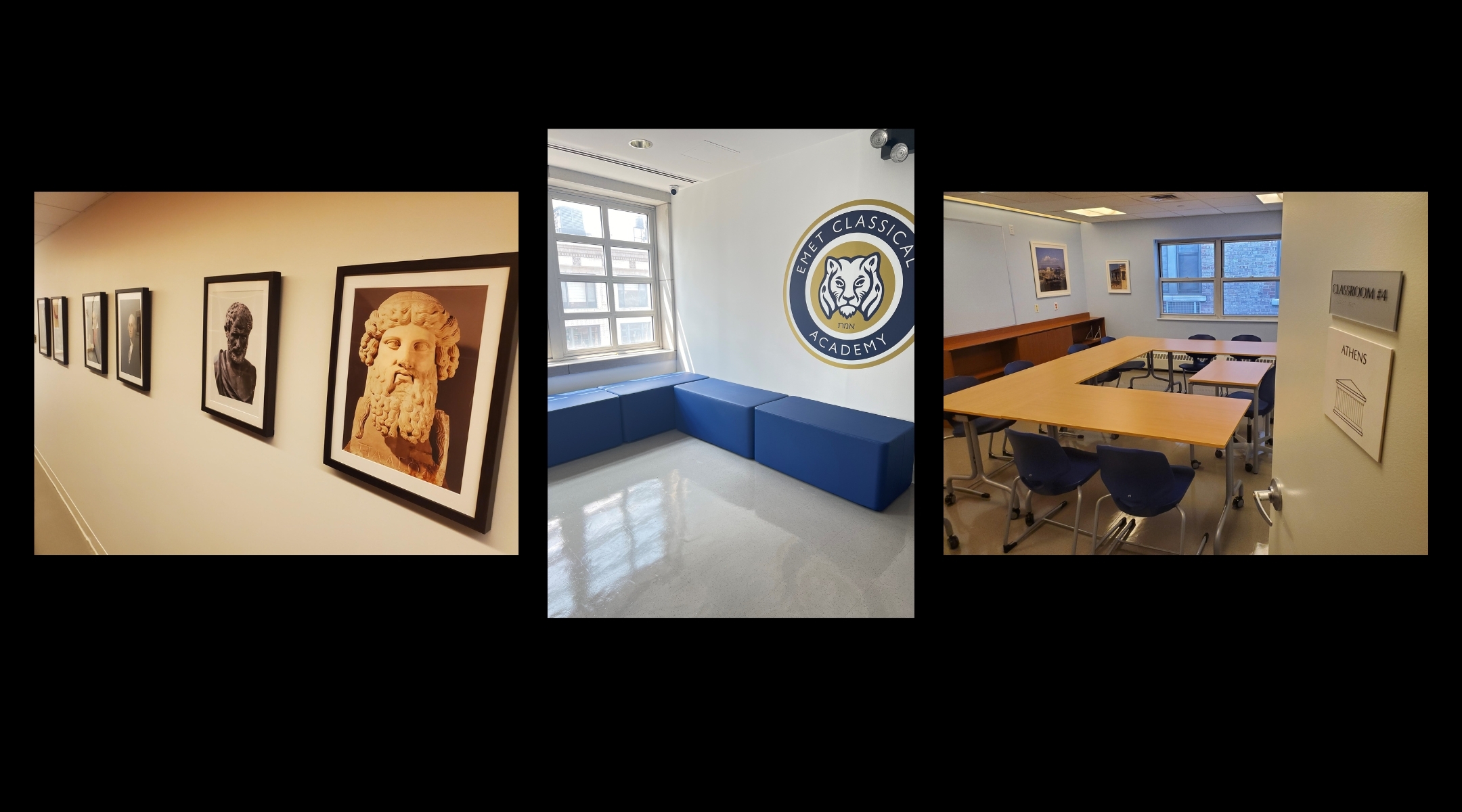When the Tikvah Fund announced in December that it would be opening a new Jewish school that teaches Greek and Latin and eschews progressive educational values, it wasn’t clear just how many families such a niche option would attract.
A month later, Emet Classical Academy said it had received “hundreds of admissions inquiries from families,” many of them distressed about antisemitism and progressivism in their children’s schools in New York City amid the Israel-Hamas war.
Now, enrollment is set for Emet’s first year. Nearly 40 students are on the rolls across three grades — fewer than seemed possible earlier this year, but also more than the school originally planned to serve.
“Initially Emet planned to begin with only a small sixth grade and add a grade each subsequent year,” a representative from the school told the Jewish Telegraphic Agency in an email. Instead, Emet is opening with fifth, sixth, and ninth grade classes, “due to overwhelming interest.”
The new students come from both public and “elite secular private schools,” according to the spokesperson, who said enrollment is projected to triple next year and to reach 250 students in middle and high school by 2027.
The school is part of a movement to advance a “classical” education model that has risen in popularity in recent years, particularly among political conservatives. Proponents of classical education say it centers values and skills that have been wrongly deemphasized by progressive educators. Its critics charge that it advances a nostalgic worldview that gives short shrift to women, people of color and non-Western voices that deserve a place in the contemporary canon.
Both sides say the model has been closely entwined with Christian ideals. Hillsdale College, a Christian college in Michigan that is a driver of conservative thought, has launched or worked with dozens of classical schools across several states. (A Hillsdale professor is on Emet’s academic advisory board.) Some advocates of classical education say it is inappropriate to create irreligious versions of classical schools.
Emet represents the first major Jewish foray into the classical education field. “The vision for Emet is really simple,” Rabbi Abraham Unger, the founding head of school, told JTA. The plan is to “focus on the great intellectual history of the west, from antiquity and the Greco-Roman period, all the way through the modern era, and to do so in a Jewish environment.”
Alongside reproductions of Marc Chagall’s “Jerusalem Windows,” the hallways are decked with photos of busts of Greek and Roman philosophers; a photo of Margaret Thatcher, the conservative British prime minister; and the famed painting of George Washington crossing the Delaware. The four classrooms are named for four cities seen as pivotal to the development of Western civilization: Jerusalem, Athens, Rome, and Philadelphia.
For the last two years, Unger — who has both Orthodox ordination and a doctorate in political science — has led the Millstone Scholars Program, an after-school Jewish program for middle school-age children run by the Tikvah Fund that similarly promotes a classical education model.
Millstone began just two years ago with a handful of students in downtown Manhattan, learning about Jewish literacy, Zionism and the American Jewish experience, once a week after school, according to Unger. Now, the program has nearly 200 students in 17 chapters across the country, with more opening this year.
Both Millstone and Emet are rooted in a belief that students are better served by studying primary texts over academic interpretation. So students might, for example, read letters written by the Founding Fathers and then discuss them in a seminar-style class, instead of reading about those letters from a textbook.
They are also responsive to the argument, made prominently in recent years by some commentators including the self-described “heterodox” Jewish commentator Bari Weiss, that too many schools overly prize contemporary values of diversity and inclusion, even when doing so requires quashing intellectual openness and teaching children to reject patriotism — what the commentators decry as “woke” values in education. (Many educators and others reject the critique, saying that teaching about diversity is in keeping with a strong education.)
Weiss, the founder of The Free Press who has become a thought leader for “politically homeless” Jews, many disillusioned by progressive spaces, noted when the Tikvah Fund announced Emet’s launch last year that she had tweeted a call for a school in its vein back in 2020.
Referring to a college with a curriculum built around the “great books” of Western civilization and two non-Jewish elite private schools, Weiss had tweeted, “If @tikvahfund started a school with a St. John’s style curriculum in NY or LA I think they could charge more than a Dalton or a Harvard-Westlake and still be massively oversubscribed.”
The size of Emet’s first cohort and the projected full size of the school put it in line with some Jewish schools in the city, though much smaller than the Jewish high schools in Manhattan that students might otherwise attend.
Emet is charging less than those schools, with tuition set at $36,000 a year, compared to $64,300 at Dalton, located just blocks away on the Upper East Side of Manhattan, and more than $56,000 at the Abraham Joshua Heschel School, Manhattan’s pluralistic Jewish high school.
Kira Krieger Senders is one of the parents who has opted for Emet this fall; her son is coming from a public elementary school in the neighborhood. She told JTA that she was attracted in part by having experienced antisemitism in her own life — but she said she had other reasons for picking Emet.
“I love the fact that this school is going to be focusing on the old-school way of learning: use a pen and paper, write a statement down, look at our primary source and read it through and highlight it the way you want it to read, not the way someone else tells you to read,” she said. “It’s going to allow the kids to be thinkers on their own and come up with their own thoughts.”
Krieger Senders said she did not feel connected to the right-wing and Christian endeavors that have so far been the most prominent avatars of classical education.
“I feel very strongly that I do not want this school ever to be grouped into any of these faith-led schools that are not Jewish. We’re nothing like that,” she said, pointing to coverage of homophobic bias incidents at Hillsdale reported last year in The New Yorker, referring to them as “bigoted, faith-based, discriminatory overtures.”
She added, “I would never want to ever be boxed in [as] someone who would support a school like that.”
Krieger Senders herself attended Jewish day schools on Long Island, though Emet’s Jewish experience will likely be very different from those she experienced.
Like other Jewish schools, Emet places a strong emphasis on Jewish identity and Zionism, with coursework on ancient and modern-day Israel as well as the historical context of the development of rabbinic tradition. But it is not a religiously observant school, which its founders say appeals to some parents who might prefer an exclusively Jewish setting but not intensive Jewish studies.
Morning prayer — held according to the Orthodox custom, though students come from a range of traditions — is optional. Hebrew is just one of the classical languages taught, not the centerpiece of language study. And while classical music is a requirement and “Military History & Grand Strategy” is an option, Talmud, the central text of Rabbinic Judaism that is a standard of traditional Jewish study, is not on the curriculum. There might be an after-school course, if the schedule works out.
The school has not publicly announced its full staff, but over the summer it revealed that Chana Ruderman would be the principal and academic dean. Ruderman has a doctorate from the University of Chicago’s Committee on Social Thought and also helped start an Orthodox day school in Dallas that grew from 165 to 450 students in the decades when she worked there.
Ruderman, who left the Torah Day School of Dallas after last year, also was featured in a 1999 Dallas Observer article as a homeschooling mom who spurned local schools because of their values and who relied in part on materials designed for a Christian homeschooling population. She would black out texts that proselytized, she and her daughter told the newspaper.
Although Emet may feel like a radical departure in the current climate, it’s not actually a total break from tradition, according to Ben Jacobs, a research associate professor in experiential Jewish education at the Collaborative for Applied Studies in Jewish Education at George Washington University.
“In some respects, this is a new endeavor,” Jacobs said. “In other respects, this is a continuation of a longstanding vision of what some form of day schooling could look like that goes back a few centuries to where the notion of a day school originally emerged: that it would combine the best of all learning, both classical or general education and a Jewish education under one aegis, and take up the entirety of one’s day.”
Jacobs added, “In Jewish education, or Jewish life in general, we’re always so interested in what’s new, what’s innovative, what’s responsive to contemporary needs. The irony is that something so traditional is what’s countercultural now.”
Emet’s first students arrive on Sept. 5. The same day, according to the school’s website, applications open for the 2025-2026 school year — when five grades will be in attendance.
The New York Jewish Week brings you the stories behind the headlines, keeping you connected to Jewish life in New York. Help sustain the reporting you trust by donating today.





